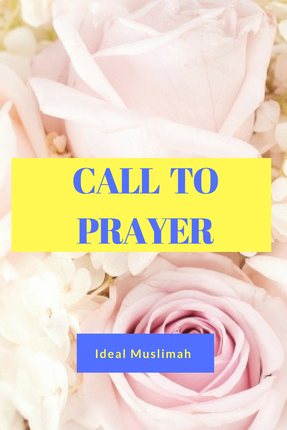|
*This article is written by an SFC Guest Contributor *  Bismillah al-Rahman al-Raheem Salah, fasting, paying zakat, dressing modestly and observing proper gender relations—these are all things that come into our minds when we think of our Islamic duties and obligations. We tend to think primarily of the “rules” or the more ritual aspects of our worship, but today I want to begin my writing for the Ideal Muslimah section here at Striving for Clarity with a series on a characteristic that is just as important for our faith as those mentioned above : sound Islamic manners. The above hadith is just one of many that emphasizes the importance of manners and etiquette in the deen of Islam. One of the things that attracted to me to Islam in the very beginning of my journey was the fact that Islam is such a “social” religion, in that in the Muslim community, how we treat one another is of the utmost importance. Another hadith even equates being a perfect believer with having good manners:
The aim of this new mini series is to go through some of the important aspects of proper manners and etiquette that an ideal Muslimah should strive to cultivate. For this first post, I will provide a general overview and in shaa Allah, delve more in-depth in future posts. I will get into detail on some of the various traits and aspects of good manners that are mentioned in the Qur'an and sunnah. Today I would like to touch on the underlying theme of respect. In my opinion, respect is the origin of all good manners. When we see the word respect, it is probably very easy to call to mind a couple of people that we feel respect for in our lives. For me, when I hear respect, my mother's face immediately appears, as well as my husband's and my grandfather's. If I widen that scope a little bit I can think of various scholars and speakers whose work I respect, and of course when I think of respect I would be remiss if I left out our beloved Prophet (ﷺ) and the whole generation of righteous Muslims at that time. While this is a good start, as a community and as individuals, we need to dig deeper. It is easy to respect the people that we love or public figures whose private lives we may never see. But what about the rest of the world? If we look within our hearts, how much can we truly say we respect those who differ in opinions from us? Those we see in less fortunate circumstances than us? How much do we respect Allah's عز وجل weaker creations? Allah عز وجل says in the Qur'an
0 Comments
This "Micro-Series" is written by an SFC Guest Contributor, Khi'dah Nayar  The first definition for Hijab is a literal translation-“something that covers and conceals completely.” or “To hide oneself from view” - the fabric must be thick enough so as not to show the color of the skin or shape of the body. The second definition is based on Islamic jurisprudence (the science or philosophy of law), an interpretation translated from Sharia; “To cover, conceal or hide oneself from view of those with whom marriage is or may be permissible.” All schools of Islamic jurisprudence agree: “veiling the face is part of hijab.” Other references to hijab: Hijab bi al-buyut – observing hijab by staying in the home. Abaya – a loose robe worn by Muslim women that covers the entire body from head to toe. Jilbab - an outer sheet which hides the body completely, a Muslim woman wraps it around herself on top of other garments to cover her body. Satr - a portion of the body (private parts) which the Shari’a requires to be covered and which may not be exposed to others (to uncover satr for medical treatment, certain restrictions apply). Nafs - The (lower) self that is the source of base (immoral) desires. The rule of modesty applies to both men and women. “O mankind! Fear your Guardian Lord, who created you from a single Person, created,out of it, His mate, and from them twain scattered (like seeds) countless men and women; Fear Allah, through whom ye demand your mutual (rights) and be heedful of the wombs (that bore you): for Allah ever watches over you.” Qur'an 4: 1;34 Hijab is protection for women against pornography, rape and sexual molestation (in some countries). It serves as a barrier to restrict ill-natured men from aggressive sexual behavior. It is the religious duty of men to practice modesty, morality and to respect a woman’s privacy. It is the religious duty of women to demonstrate dignity, observe practices of morality and dress modestly. Modest behavior means avoiding public displays of sexual attractiveness to draw attention from the opposite sex. Women do this by being flirtatious, wearing transparent garments or clothing that displays a woman’s shape, including wearing short sleeves, low cut (short) dresses (exposing the bosom & legs), being undressed (i.e., in underwear, bathing suits) and naked.
Stay tuned for the next part of this Micro-Series. This "Micro-Series" is written by an SFC Guest Contributor, Khi'dah Nayar  Al-Hayaa + Hijab = Iman Al-Haya is an expression of shyness, a natural and conscious inclination to practice restraint before Allah(SWT). It causes us to feel a sense of guilt or shame before committing a sin. An example of shyness is not initiating conversations, participating in vain talk, touching or shaking hands, or allowing ourselves to be touched by men, even though they may be acquaintances, neighbors or distant male relatives. And say to the believing women that they should lower their gaze and guard their modesty; that they should not display their beauty and ornaments except what (must ordinarily) appear thereof; that they should draw their veils over their bosoms and not display their beauty except to their husbands, their fathers, their husband's fathers, their sons, their husbands' sons, their brothers or their brothers' sons, or their sisters' sons, or their women, or the slaves whom their right hands possess, or male servants free of physical needs, or small children who have no sense of the shame of sex; and that they should not strike their feet in order to draw attention to their hidden ornaments. And O ye Believers! turn ye all together towards Allah, that ye may attain Bliss." Qur'an 24:31 When we become parents, our obligation as Muslims is to nurture the minds and souls of our children. With the help and mercy of Allah (SWT), we are entrusted with their care. We must prepare them for school by teaching them how to socialize with others. Throughout their lives we teach them appropriate manners, morals and etiquette as practiced in Islam. We cover their heads, dress them modestly and give them the benefit of understanding the importance of al-haya (shyness) and the virtue of hijab. And most importantly we teach them the reason why . . .”Because we are Muslim.” To Understand Why Muslim Women Cover (or Veil), we must study the Holy Qur’an. Allah(SWT) commanded Muslim women to cover (head to toe) so that people are able to distinguish them as upright citizens from pious and respectable families. No one will stand in their way, follow them or make sexual advances toward them, due to their higher social status. The heart of a Muslim woman cannot be corrupt. Islam restored full rights of women to lead noble and productive lives in a civilized and ethical system Stay tuned for the next part of this Micro-Series.
In the Name of Allah, Most Gracious, Most Merciful  Surah Al-Muzzammil “Truly the rising by night is most potent for governing (the soul) and most suitable for (framing) the word (of prayer and praise).” When reading this surah I was reminded of the significance of “prayer and the practice of humility” in our spiritual life and the fate of those who reject faith and revelation. I noticed Muslim women avoided visiting each other especially before the time of prayer? Maybe some were to busy with children but others felt the same way I used to feel. I was a little nervous and shy about leading the prayer in my home. Usually, my thoughts did not focus on demonstrating my best efforts or learning from guests in my home. I was self-conscious and lacked confidence in my recitation, my Arabic was poor, my knowledge of Islam was limited and I was concerned about the size and comfort of our prayer space. Yes it was my foolish pride. I also remembered being told that sometimes husbands or brothers would recite only the shortest surahs in the Qur’an, as fast as they could. Do you think they rushed to complete the prayer because they were busy with other things or had it become a boring ritual? Also, some Sisters said they preferred not praying at a particular mosque or with a particular Imam. Other Sisters chose not to pray at any mosque. I believed these were cultural issues. “May Allah forgive us.” When is the best time to study the Holy Qur’an with children? They are called “teachable moments.” I understand how hard it is to make time to worship Allah as a family. Especially these days, our lives are filled with so many family or individual social activities. When we were new parents, my husband and I never talked about how to raise Muslim children. Some of our Muslim Brothers told us they planned to marry a woman who had memorized Al Qur’an. This was their plan for teaching Islam to their children. Other parents decided to rely on private tutors and weekend schools at the mosque. We decided to enroll our youngest child in a full-time Islamic school. Her recitation became much better than mine and she actually taught me. I also researched games, puzzles, books and toys to help us study? Some of the other questions included learning and teaching our young appropriate methods for responding to questions and comments from friends and neighbors and also how to talk to others about Islam? Before your child asks the question, be prepared with the answer, or search together. This article is part of the "Micro-Series", The Virtue of a Muslim Woman. Stay tuned for the next part of this Micro-Series.
In the Name of Allah, Most Gracious, Most Merciful  Prayer is the second Pillar of Islam. It is an expression of a Muslim’s dedication and devotion and the only path to Jannah (Paradise). I began to pay closer attention to what was going on in my household and then I started talking with other Muslims about the practices of prayer at home. When women started talking to each other about some of their difficulties when learning to live as Muslims or with Muslims, the subject of understanding the prayer schedule and learning how to organize family time is usually discussed. I have learned that we need explanations about how prayer times are calculated and adjusted for time changes around the world and in the spring and fall seasons for “U.S. daylight savings time.” We also had a need to become more familiar with lunar calendars, moon cycles and the significance of the new moon in relation to beginning the (9th) lunar month of Ramadan, EID prayers and the Hajj season. From my past experiences, I thought it would helpful to share my thoughts (previous errors and mistakes) about what “really” happens when Muslim women, single or married (with or without children) pray at home before learning to lead each other at the time of prayer. I wrote a short list of some of my experiences and added a few comments shared with me by American Muslims. Some of these women I met when my children were younger. Prayer time at my home. Previously, I had printed copies of the prayer schedule (from my computer) on bright colored sheets of paper posted around the house. I hung up lunar calendars printed by the mosque with the prayer schedules on it. We received an adhan clock as an EID gift. Now we each have apps on our mobile phones. They are not always synchronized, so before we pray, the adhan is echoing throughout the house. Muslims in America do not have the benefit of living near a mosque where we can hear the adhan on loudspeakers. Some local laws forbid it. Here is a sampling of my other observations.
Well, as for the rest of us? Some of us are eating, talking or texting, sleeping or just being lazy. Some of us watch television or do absolutely nothing outside the house except feel annoyed about “the prayer police” . . . better known as our own conscience. I think, subconsciously, we wait until prayer time has passed, then we tell ourselves that we will make-up the missed prayers, because we have no other excuse. Then there were discussions about whether or not women should pray in the car or pull over and get out of the car. Also deciding to wait and pray at home or go to the mosque. Sisters asked advice about fasting and prayer during pregnancy or when in poor health. Then I asked, what about women who are hearing impaired deaf or visually impaired or blind? Do you want to know how we resolved these issues? This article is part of the "Micro-Series", The Virtue of a Muslim Woman.
In the Name of Allah, Most Gracious, Most Merciful  The first time I heard the Adthan(call to prayer), I stopped to listen to one of the most beautiful voices I had ever heard. At that moment, I realized that I had passed this mosque every day on my way home from work. But on this day, after working only half of the day, I planned to sit in the park by the river, time to reflect. I later learned this day was called Jumu’ah, the Day of Assembly for Muslims. I remember the time was 1:00 pm. A young woman invited me to come inside. She motioned for me to remove my shoes as she handed me a lovely scarf and garment to cover my head and body. Then she directed me toward the mosque library. “Stay as long as you like Sister, there are books you may take with you.” I sat for over an hour reading and listening to the khutbah (sermon). The topic of this sermon was prayer. Since my parents (now deceased) were Christians the practice of prayer was performed mostly at church, at the dining table and at funerals. Verses from the Bible were usually read by adults. I didn’t know about any other form of prayer. A Muslim woman’s day begins before dawn, she completes ghusl or wudu (ablution) with calmness of mind and a grateful heart. She expresses her gratitude by reciting, “Bismillaah, Subhanah Allah, Alhamdulilaah, Allahu Akbar” as she opens her eyes to see another sunrise, for having good health and standing for fajr salah. She offers two voluntary rakats before reciting the divine ayats (verses) of praise and worship for Al-Mulk (The Sovereign Lord). A Muslim woman makes her intention to submit her will and humble herself before Allah (subhana wata’Allah) and repeats, “I seek refuge from satan, the rejected enemy” before each surah. Prayer, being the 2nd pillar of Islam is very important to Muslims. It is an expression of a Muslim’s dedication and devotion and the only path to Jannah (Paradise). By preserving the Holy Qur’an, through memorizing and reciting, a Muslim woman purges bad deeds from her life and begins to taste the sweetness of faith. Muslim women are the cement in the foundation of society, community and family.  Striving For Clarity has started a new "Micro-Series" focused on the qualities and essence of a Muslim woman. The micro-series will consist of short articles written by our Guest Contributor, Khi'dah Nayar. Articles in this series will be posted weekly. About Khi'dah NayarI am a Muslim woman, born in the U.S. and married to an American Muslim. We have four (adult) children. When our youngest child was a middle school student at a private Islamic school, we found opportunities to work with the Muslim community at the grand mosque. We helped coordinate and bring teachers to the community for adult education English, Computer Literacy and U.S. Citizenship classes. Muslim women from Africa, Asia, Caribbean Islands, and South America filled the center. My beloved Muslim Sisters taught me more about Islam, modesty, patience, faith and love for the sake of Allah than I could have learned from any book.
|
IntroductionThe "Ideal Muslimah" section of Striving For Clarity provides an array of articles, micro-series and short tidbits geared towards highlighting the important characteristics of a Muslim woman. Archives
March 2022
Categories
All
|



 RSS Feed
RSS Feed